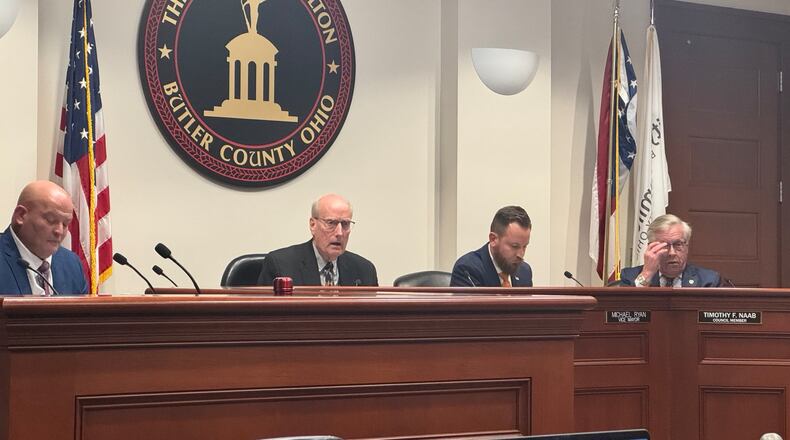Hamilton City Council is the latest community in Butler County this week to enact a temporary ban on recreational marijuana business licenses, approving a 6-month moratorium on Wednesday.
On Monday, Fairfield City Council approved by a 6-1 vote to enact a nine-month moratorium disallowing recreational marijuana license-holders from operating within the city. Then on Tuesday, both Liberty Twp. and West Chester Twp. trustees enacted similar 360-day bans.
As the expirations of each moratorium approaches, the local government leaders said they’ll reconsider the issue before the bans end.
Hamilton took several revisions to the ordinance to be able to pass a temporary ban ahead of Ohio’s recreational marijuana laws taking effect. Because of the uncertainty of how fast or slow the Ohio legislature would move on coming up with rules and regulations, Law Director Letitia Block advised council it would be prudent to have something on the books prior to Thursday.
Though at first, Council member Eric Pohlman did not want to put a timeline with a ban, he conceded first to having a year-long ban, and then reluctantly to the six-month ban. He said for the good of getting an ordinance in the books, though “it’s against my heart,” was why he agreed to a six-month timeline.
Council members Joel Lauer and Susan Vaughn wanted to have a timeline put on the ban, both saying while it gives the city time to carefully establish possible local rules and regulations, Lauer said a timeline “holds us accountable.”
Hamilton Council member Tim Naab said Wednesday’s discussion was a show of a council who is “very committed in making sure this moves forward expediently, but on purpose and by design.”
Naab said he wants to also have a business plan developed, whether it’s by a committee of council, administrators, or a combination of the two, but Block said it would be prudent to hold off on that, calling any attempt to establish local rules “chasing a moving target” as Ohio lawmakers haven’t decided on any regulations outside of the voter-approved law.
Vice Mayor Michael Ryan said “Once the state has clearly defined a path forward, I would like to reconsider lifting this prohibition before June 12, or later if we have to, but it’s strictly based upon what the state of Ohio is going to do.”
The Hamilton City Council is the latest local governmental body to consider such legislation following the Nov. 7 vote with Issue 2 to legalize recreational marijuana in Ohio. Issue 2 passed with 57% of the vote statewide, making Ohio the 24th state to legalize recreational marijuana.
The law takes effect Thursday, which could be altered by the Ohio legislature, but for now, it allows, among other things, adults 21 and over to legally possess up to 2.5 ounces of marijuana, as well as use and grow (six plants per person and 12 per household). It also imposes a 10% sales tax.
The new law also allows local governments to prohibit or limit the number of operators, processors, and cultivators from operating within the city, according to Ohio Revised Code section 3780.25. It also states that local governments are able to prevent license holders from operating within their jurisdiction, even after a license is issued and the business is operating, according to the same section of the ORC.
Council members agreed to discuss the matter further to develop a plan of action once the state has established rules. This six-month ban could also be extended when it expires on June 12.
While the economic impact wasn’t a focal point of Wednesday’s discussion, the new recreational marijuana laws is expected to be a tax windfall expected for communities and the state. Collectively, tax collections are expected to be in the hundreds of millions of dollar with the Ohio State Moritz College of Law projecting anywhere from $276 million to $403 million to be collected in annual tax revenues, if the General Assembly doesn’t alter the tax structure.
In addition to tax collections, Hamilton could further benefit financially from cultivators and processors operating in the city as the city is Ohio’s only municipality to operate all four major utilities (electric, natural gas, water and wastewater).
It’s also important to note that while communities are prohibiting some recreational marijuana business licenses from opening, they cannot block marijuana research. According to the new law, no local legislative body can prohibit laboratory research related to marijuana, including at a state university, academic medical center or private research and development organization.
About the Author

